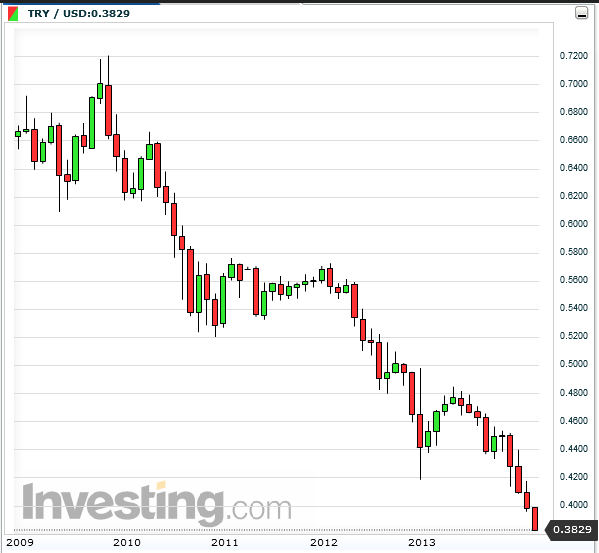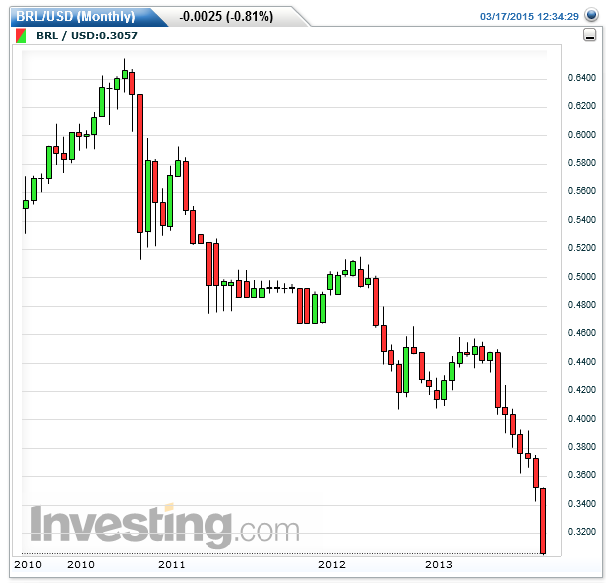IMF Fears "Taper Tantrum"; Rear View Mirror Discovery
The totally useless and always late to the party, Christine Lagarde, just now warns of Emerging Markets Instability.
The head of the International Monetary Fund warned on Tuesday that emerging markets are set to face a renewed period of economic instability when US interest rates rise this year, forecasting a repeat of 2013’s damaging “taper tantrum” episode of capital flight and rapid currency depreciation.
The IMF chief said she feared that negative “spillover” effects from these increases would lead to a re-run of the crisis that hit developing economies such as India and Turkey nearly two years ago, following hints from then Fed chair Ben Bernanke about an early end to the institution’s bond purchasing programme known as quantitative easing.
“I am afraid this may not be a one-off episode,” Ms Lagarde said. “The timing of interest rate lift-off and the pace of subsequent rate increases can still surprise markets. The danger is that vulnerabilities that build up during a period of very accommodative monetary policy can unwind suddenly when such policy is reversed, creating substantial market volatility.”
Taper Tantrum
How did Lagarde arrive at her not so amazing prediction?
I believe she finally opened her shades and looked out the window.
She saw a currency crisis in Brazil, a currency crisis in Turkey, and capital flight out of China.
Turkish Lira vs. US Dollar

Brazilian Real vs. US Dollar

Chanos Sees China Capital Flight
Flashback October 28, 2014: Short-Seller Chanos says China Seeing Faster Capital Flight.
Hedge fund manager Jim Chanos, who has a long-running bet against China, said that the country's credit bubble was starting to cause capital outflows to accelerate and may ultimately lead to weakness in the nation's currency.
"It's safe to say it's accelerating," said Chanos, speaking of capital flight out of China, and said China's quarterly drop in foreign exchange reserves was "noticeable."
China's foreign exchange reserves fell in the third quarter by $105.5 billion, the first quarterly fall since 2012 and the largest dollar decline on record, according to People's Bank of China data.
Uncovering the Conduits for China’s Capital Flight
On March 6, Andrew Collier of Orient Capital Research wrote an excellent article on Conduits for China’s Capital Flight.
Chinese investors have discovered a new way to spirit money out of the country behind the backs of the country’s regulators.
In recent years, savvy investors have used false invoicing as a way to disguise their capital flight. A Chinese company pays $1m to a foreign company for a machine tool that is actually worth $500,000; the rest is invested in property or stocks in London or Sydney or New York.
In the fourth quarter of 2014, the China Banking Regulatory Commission (CBRC) became wise to the scheme and began requiring banks to provide more documentation when they allocated foreign exchange to such overseas transactions. As a result, this form of evading capital controls has become more difficult to pull off.
Instead, clever bankers have discovered a new way to move the money offshore for their clients: service payments. Instead of overpaying for an item, they simply pay for a service that never occurred.
Why is this capital flight occurring? With China’s property bubble coming to an end, the ability to generate quick profits through the Shadow Banks is no longer available to the country’s wealthier citizens. Many also are faced with President Xi Jinping’s continuing crackdown against corruption.
Fake companies
We interviewed bankers in China who were quite candid about how they evade capital controls. Currently, the State Administration for Foreign Exchange (SAFE) has the fewest document requirements for consulting and service fees. “It’s simple for our clients to get the proof of materials as long as they know an overseas company that is willing to write a receipt. In fact, a VAT invoice issued by a restaurant in China could have more legal power than the receipt provided by an overseas company,” one foreign commercial banker in Shanghai told us.
There are a couple of methods that have become popular over the past few months.
1) Study Abroad Schemes
2) Interbank Borrowing
3) Overseas Branches of Domestic Companies
4) False Joint Ventures
Many domestic companies have established joint-venture companies with their own overseas subsidiaries, even though this is technically illegal. The JV partner keeps the profits for overseas investing.
How Big is the Problem and What Does it Mean for China’s Economy?
The SAFE, CBRC and other regulators in Beijing appear to be unaware of how large these transfers are. Bankers involved estimate that as much as 40% of the larger service transactions do not involve actual services. This suggests close to $200 billion of all service payments are in reality permanent exports of capital. That number could double in 2015.
Rear View Mirror Discovery
The already well established "tantrum" is actually part of the "Dollar Shortage" thesis. For discussion, see Dollar Shortage Revisited; Is Japan Zimbabwe? Who's in Control? World Gone Mad.
Central banks, other policy makers, and the IMF only see problems after they are well established. Now, out of the blue, they warn of currency crises and emerging market instability that should have been easy to spot over a year ago.
Capital flight out of China has been accelerating for some time, a slowing China has had a huge spillover on Australia and Brazil, and even though it's obvious global growth has slowed to the point of recession, the IMF still has not figured that out yet either.
I have heard back from Anne Stevenson-Yang regarding her excellent presentation on China. Yang maintains China is barely growing if at all. (See Reality Check: How Fast is China Growing? Global Recession at Hand).
I have an excellent power point of hers to share, including a few updated slides. I hope to get this out later today or tomorrow.
Mike "Mish" Shedlock
Disclaimer: The content on the Global Economic Trend Analysis site is provided as general information only and should not be taken as investment advice. All ...
more


